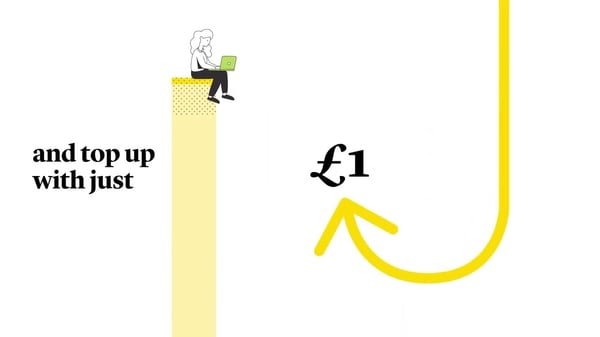What is a stocks and shares ISA?
A stocks and shares ISA is a simple, and in most cases tax-free way of investing in the stock market. A stocks and shares ISA’s value can go down as well as up, so they’re generally used as a long term investment for five years or more.
“The key thing to remember is that investing is for the long term. With time on your side, you can potentially balance out the ups and downs of the market.” – Lorna Shah, MD Legal & General Retail Retirement
That risk of losing money is the key difference between this kind of ISA and cash ISAs. For a more detailed comparison, check out our Cash ISA vs stocks and shares ISA article. Our Types of ISA article gives you the lowdown on all four types of ISA currently available.

Ready to start investing?
Our Stocks and Shares ISA makes investing simple. Find out how you can start from just £20 a month.
How does a stocks and shares ISA work?
You start by shopping around and finding the best ISA for you. Then when it comes to the money you invest in your stocks and shares ISA (or S&S ISA), you can:
- choose your shares yourself or follow expert recommendations
- find an investment fund to manage your shares for you
Because you’re doing that through a stocks and shares ISA, in most cases any income and growth you get from your investments will be tax free.
Here's a video about how our own Stocks and Shares ISA works:

Legal & General Stocks and Shares ISA / 01:40
Join the nearly 4 million people in the UK who currently benefit from tax free savings, by investing in a Stocks and Shares ISA,
Legal & General have made investing simple.
You can start investing with as little as £20.
You can top up whenever you like with a minimum of £1.00.
You can access your money whenever you want, but investing is best when you think long-term, ideally 5 years or more.
You have two ways to invest in your ISA.
Select level of risk you're happy with with our Simple fund choice tool
or, select a fund from the extended fund range
Let us look after your investment.
So you can focus on how you might use it.
The value of your investment will fall as well as rise, and it's not guaranteed.
You may get back less than you invest.
Sign up in minutes, Choose the best investment option for you.
Decide how much you want to invest, and we'll instantly set up your account so you can track your investment and make changes whenever it suits you.
Investing made simple with Legal and General Stocks and Shares ISA.
Visit legalandgeneral.com/investments to sign up.
How to invest in a stocks and shares ISA
To invest in a stocks and shares ISA, you can:
- Take out an ISA directly from an ISA provider, like us
- Go through a fund manager
- Find one through a discount broker, fund supermarket or a bank
You can usually open new stocks and shares ISAs online. Then you can:
- Invest a single lump sum
- Put in spare cash whenever you’ve got it
- Set up a monthly direct debit
You’ll also decide how your S&S ISA money is invested. Typical options include:
- Putting it into one fund
- Choosing several funds
- Investing in a ready-made portfolio
Our 'A Little Bit Richer' podcast episode ‘Take your first investment steps’ talks more about how to get started with a stocks and shares ISA.
What are stocks and shares?
In investments, the words “stock” and “share” have pretty much the same meaning. But they can be used in slightly different ways.
The word “share” can describe a single unit of ownership in a company, while “stock” describes more general ownership. So you can:
- Own 100 Good Investment Corp shares
- Hold stock in Good Investment Corp
Our Investing for beginners article goes into more detail on all this and more.
Stocks and shares ISA fees and charges
Standard stocks & shares ISA fees can include:
Platform fee: This is your provider’s charge for using their service. It may be a fixed monthly or annual amount, or a percentage of your portfolio’s value.
Fund fee: This fund management fee may be fixed, performance-based or a percentage of your fund’s value. It’s usually taken from your fund's returns rather than paid directly.
Transaction fee: This fee covers buying or selling through your S&S ISA. It may be a fixed amount per trade, or a percentage of the trade value. Some providers may offer free trades to attract customers.
Exit fee: This covers taking money out or transferring it. It may be a fixed amount per withdrawal or transfer, or a percentage of their value. Not all providers will charge an exit fee.
These fees can vary widely across different providers and have a big impact on your returns. So make sure you:
- Compare stocks and shares ISA charges and fees before choosing one
- Check them regularly to confirm you’re getting value for money
Do you pay tax on a stocks and shares ISA?
No. One of the main benefits of a stocks and shares ISA is that you don’t pay any UK income tax or capital gains tax on any income or gains. And you don’t have to declare any income or capital gains on your UK self-assessment tax return. But you may have to pay a stamp duty charge on any sale and purchase of investments.
How many stocks and shares ISAs can I have?
You can own as many different ones with as many different providers as you want and you can pay into more than one of each type of ISA in each tax year.
- In 2024/25, Leah saved a total of £4,000. She wanted to spread the money across her cash and stocks and shares ISAs. She actually has two stocks and shares ISAs, a high-risk one and a low-risk one
- She put £2,000 into her cash ISA. That left her with £2,000 to put into one of her stocks and shares ISAs. She was feeling cautious, so she put it into her low-risk one
You have a maximum annual ISA allowance of £20,000, which is the maximum you can pay into all your ISAs each tax year. So Leah could have paid up to £16,000 more into one or more of her ISAs if she’d been able to save that much.
Cash vs Stocks and Shares ISA
Want to learn more about these two popular ISA choices? Our guide looks at how these two popular ISAs work and which might be right for you.
Are stocks and shares ISAs worth it?
If you’re looking to invest for five years or more, S&S ISAs could be the right choice for you. As a longer-term product they can ride out the ups and downs that are a normal part of investing.
As with all stocks and shares investments, you could get back less than you put into them. If you’re worried about that sort of risk, then a cash ISA might be a better choice.
To find out more about investing and think about your approach to risk, take a look at our Understanding risk article.
FAQs
That depends on why you’re thinking about cashing it in.
If it’s because your investment’s value has dropped it might be better to wait and see if it goes back up. But equally, you might need your money urgently. Or you could transfer to another provider or a different type of ISA.
So that’s a very hard question to answer! If you’re not sure, professional financial advice could help.
Which fund is right for you will depend on how much potential growth you’re after and how much risk you’re willing to take to get that growth. If you’re ok with possibly losing some of your investment, a potentially higher risk / higher return fund could be right for you. If not, look at lower risk ones.
You might also be able to invest across a range of funds, for example balancing different levels of risk across them. Whatever you choose to do, make sure you factor in any fees. They can make a big difference to your investment returns.
Your returns will depend on the performance of your investments. And that depends on how the markets do and what investment choices you make.
In general, stocks and shares tend to offer higher possible returns than cash or savings over the long term. But that’s not guaranteed – in fact, you could get back less than you invest.
It depends on the provider and product. You can open our Stocks & Shares ISA with a regular payment of £20 a month or a £100 lump sum. Your minimum top up amount will be just £1.
Related articles

Types of ISA

What’s the best ISA for me?

Investing for beginners
Sign up to our newsletter
Subscribe to our newsletter for tips on how to make the most of your money now, and in the future.
Our team hand picks a selection of our latest articles and stories that we think you’ll find interesting. Subscribe to our newsletter and have the opportunity to enter exclusive prize draws, be invited to share your own stories, and be kept updated with tips and tricks to help you manage your finances.
By providing your email address you're giving consent for us to send you emails with news, information and offers on the products and services provided by Legal & General. Legal & General take your privacy seriously; this is why we never share your personal details with anyone else for their own marketing purposes. You can opt out of these emails at any time. Read our privacy notice to understand how we process your information.

